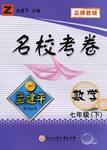题目内容
Reading Oliver James'Affluenza, I thought about what often happens at home. My 12-year-old daughter is in tears."I have so take a test tomorrow. I don't understand any of it," she cries out. After shouting and shutting her door, she calms down enough to go through her notes. The following dry I ask her how the test went and the just says "OK,I got a nine".
"Wow. well done!" I say, before she finishes with "But I never get a ten!"
According to James, this obsession with getting top marks has been a bad development, which encourages people to think of education in terms of work and money. To test this, I asked my daughter why she was so worried about her tests. She looked at me as if I was thick. "Well, if I don't get good grades, I won't be able to afford nice things like a car and stuff."
I was quite surprised, because I don't consider myself a pushy parent. But James suggests and it leaves students feeling failures even if they are very bright. He points to the Danish system(体制)of education as a better model. Creating happy citizens who have good social skills is seen as more important than high achievements at school or the needs of business.
For me, I cannot remember the last time I had to work out the area of a circle, recite a Shakespeare poem or grammar rules, yet I have lived a happy life. What I really needed to learn at school was how to make polite conversations, or how to avoid getting into debt or how to develop good personality.
This is in fact similar to what Oliver James really has in mind. And he is looking for schools where students are encouraged to find and follow their own interests, something more like Tongjon. Tongjon has been developed in some Korean private schools. It is quite different from the more rigid system of learning things by heart that is used in Korea, and indeed in many other school systems around the world.
As the Russian poet Pushkin said," Inspiration(灵感)is needed in geometry(几何学)just as much as in poetry ",and inspiration does not come from endlessly revising for tests or getting worried about them .
1.What does the writer probably think of his/her daughter?
A. She sets herself a goal too high to reach.
B. She should be more polite to her parents.
C. She is hard-working but not very bright.
D. She takes her grades much too seriously.
2.What does the word "obsession"in paragraph 3 mean?
A.A plain and unavoidable fact.
B.A satisfied and very proud state.
C.A practical and widely-used way.
D.A fixed and often unreasonable idea.
3.What can we infer from the passage?
A. Social skills are as important as high grades.
B. Interest in grades can shake self-confidence.
C. The writer regrets not having studied hard at school.
D. Danish educational system is for very smart students.
4.The writer wants to tell us that____.
A.learning happily is the key to self-development.
B. top marks may be helpful to increase one's interest.
C. tests should be improved to give children inspiration.
D. education should meet one's needs for word and money.
1.D
2.D
3.B
4.A
【解析】
试题分析:
1.细节理解题,根据文中语句“To test this, I asked my daughter why she was so worried about her tests. She looked at me as if I was thick. "Well, if I don't get good grades, I won't be able to afford nice things like a car and stuff."”理解可知。女儿对她的学习成绩非常敏感。故选D。
2.词义理解题,根据文中语句“According to James, this obsession with getting top marks has been a bad development, which encourages people to think of education in terms of work and money.”理解可知。此词的含义是迷恋,故选D。
3.理解归纳题,根据文中语句理解可知,本文主要内容是过于注重成绩会影响自信,故选B。
4.理解归纳题, 通读全文可知作者想告诉我们开心的学习对培养自信心很有益处,故选A。
考点:教育类的阅读
点评:这类文章经常会有较多的生词,但是这些生词对文章并没有实质的影响,考生要抓住主要的细节要点进行分析。

 孟建平名校考卷系列答案
孟建平名校考卷系列答案2013 年4月20日,四川省雅安地区发生7.0 级地震。为支持灾区,你们学校准备举行一场慈善义演,请你为此次活动写一篇演讲稿,让更多的人了解并积极支持此次活动。词数80词左右。
|
活动起因 |
多数房屋倒塌,许多人丧生或受伤,许多人无家可归…… |
|
活动内容 |
慈善演出的名称为“Helping the Children in Poor Areas”; 地点在操场上,下周三上午8点到10点;票价每人10元。 许多同学都愿意为义演做工作,希望大家都参加。 |
|
活动目的 |
为希望工程募集钱款,帮助失学孩子重返校园。 |
|
个人感受 |
只要人人都献出一点爱,世界将变得更美好…… |
要求:
句子通顺、表达准确,可适当增加细节使内容连贯;
文中不得使用真实的人名、校名;
短文的开头已经给出,不计入总词数。
A charity show
Because of the serious earthquake in Yaan, Sichuan Province on April 20, 2013, a lot of houses broke down.
_______________________________________________________________________________
______________________________________________________________